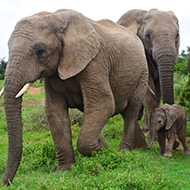
“These sentient, sensitive and highly social animals need protecting” - Dr Mark Jones.
A coalition of 60 veterinary surgeons, wildlife organisations and scientists are calling on Namibian authorities to abandon plans to sell live elephants to unknown destinations within or outside the country.
Led by international wildlife charity, Born Free, the coalition has written to President Hage Geingob, calling on him to intervene and cancel the sales, and offering their expertise to help protect Namibia’s elephants.
The move comes in response to a notice published in local media in December 2020, in which Namibia's Ministry of Environment, Forestry and Tourism advertised up to 170 live elephants for sale, including family groups and adult males.
According to Born Free, media reports suggest the Namibian authorities are claiming the sales are in response to overpopulation, drought, and increasing human-elephant conflict.
Born Free’s head of policy Dr Mark Jones said: “These proposed sales will do nothing to manage populations or mitigate conflict between elephants and people. Indeed, the disruption to elephant family groups and wider elephant society could make conflict with people much more likely.
“There is also no indication of where the animals will end up; some of them could find themselves exported to captive facilities which are completely unsuitable for wild elephants. We implore the Namibian authorities to abandon these sales and instead work with experts to find practical and humane solutions to the problems of drought and conflict, that will enable elephants and the people who live alongside them to peacefully coexist.”
Thanks to poaching, habitat loss and retaliatory killings, elephant populations are in drastic decline across much of Africa. Namibia is fortunate to be home to around 23,000 elephants, some of which are uniquely adapted to desert life.
While exports of live elephants are currently limited to in situ conservation programmes, conservationists fear that buyers could try to get around these rules by exporting elephants to zoos and other captive facilities for profit.
Dr Jones continued: “These sentient, sensitive and highly social animals need protecting. Selling some of them off to private bidders will cause immense animal suffering, and disrupt their remaining family groups and herds.”



 The Veterinary Medicines Directorate (VMD) is inviting applications from veterinary students to attend a one-week extramural studies (EMS) placement in July 2026.
The Veterinary Medicines Directorate (VMD) is inviting applications from veterinary students to attend a one-week extramural studies (EMS) placement in July 2026.